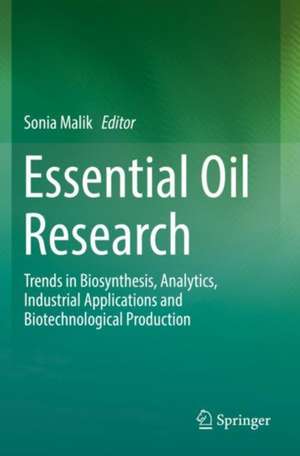Essential Oil Research: Trends in Biosynthesis, Analytics, Industrial Applications and Biotechnological Production
Editat de Sonia Maliken Limba Engleză Paperback – 14 aug 2020
This book highlights the advances in essential oil research, from the plant physiology perspective to large-scale production, including bioanalytical methods and industrial applications. The book is divided into 4 sections. The first one is focused on essential oil composition and why plants produce these compounds that have been used by humans since ancient times. Part 2 presents an update on the use of essential oils in various areas, including food and pharma industries as well as agriculture. In part 3 readers will find new trends in bioanalytical methods. Lastly, part 4 presents a number of approaches to increase essential oil production, such as in vitro and hairy root culture, metabolic engineering and biotechnology. Altogether, this volume offers a comprehensive look at what researchers have been doing over the last years to better understand these compounds and how to explore them for the benefit of the society.
| Toate formatele și edițiile | Preț | Express |
|---|---|---|
| Paperback (1) | 1007.03 lei 6-8 săpt. | |
| Springer International Publishing – 14 aug 2020 | 1007.03 lei 6-8 săpt. | |
| Hardback (1) | 1013.19 lei 6-8 săpt. | |
| Springer International Publishing – 20 iun 2019 | 1013.19 lei 6-8 săpt. |
Preț: 1007.03 lei
Preț vechi: 1228.09 lei
-18% Nou
Puncte Express: 1511
Preț estimativ în valută:
192.71€ • 199.98$ • 161.08£
192.71€ • 199.98$ • 161.08£
Carte tipărită la comandă
Livrare economică 17-31 martie
Preluare comenzi: 021 569.72.76
Specificații
ISBN-13: 9783030165482
ISBN-10: 3030165485
Pagini: 449
Ilustrații: XVI, 449 p. 70 illus., 27 illus. in color.
Dimensiuni: 155 x 235 x 27 mm
Greutate: 0.65 kg
Ediția:1st ed. 2019
Editura: Springer International Publishing
Colecția Springer
Locul publicării:Cham, Switzerland
ISBN-10: 3030165485
Pagini: 449
Ilustrații: XVI, 449 p. 70 illus., 27 illus. in color.
Dimensiuni: 155 x 235 x 27 mm
Greutate: 0.65 kg
Ediția:1st ed. 2019
Editura: Springer International Publishing
Colecția Springer
Locul publicării:Cham, Switzerland
Cuprins
Preface.- Part 1. Essential oils composition and why plants produce them.- Chapter 1. Essential oils.- Chapter 2. Factors influencing the production and chemical composition of essential oil in aromatic plants from Brazil.- Chapter 3. Hedychium Essential Oils: Composition and Uses.- Chapter 4. The Essential Oils of the Burseraceae.- Part 2. Uses of essential oils in various industries.- Chapter 5. Essential oil of betel leaf (Piper betle L.): A novel addition to the world food sector.- Chapter 6. Artemisia annua and A. afra essential oils and their therapeutic potential.- Chapter 7. Outstanding Efficacy of Essential Oils Against Oral Pathogens.- Chapter 8. Chemical diversity and insecticidal and anti-tick activities of essential oils of plants from Northeast Brazil.- Part 3. Extraction and Bioanalytical Techniques.- Chapter 9. Adulteration Analysis in Essential Oils.- Chapter 10. Essential Oils from Pines: Chemistry and Applications.- Part 4. Strategies and Technologies for Essential Oil Production.- Chapter 11. Biotechnological approaches to increase essential oil yield and quality in aromatic plants: the Lavandula latifolia (Spike lavender) example. Past and recommendations for the future.- Chapter 12. The phytochemical composition, biological effects, and biotechnological pproaches to the production of high value essential oil from geranium.- Chapter 13. Biotechnological production of aromatic oils from plants.- Chapter 14. The role of biotechnology in essential oils production from non-herbaceous plants.- Chapter 15. Eremothecium oil biotechnology as a novel technology for the modern essential oil production.- Index.
Notă biografică
Dr. Malik holds a doctoral degree in Plant Biotechnology from CSIR-Institute of Himalayan Bioresource Technology, Palampur, India. Her main area of research is plant secondary metabolites and genetic manipulation. After post-doctoral studies in Brazil, Czech Republic, and United Kingdom, Dr. Malik joined the Biological and Health Sciences Center at Federal University of Maranhão (UFMA, Brazil). She is a member of the graduate research program at UFMA and is actively involved in research, teaching and supervising students at graduate and undergraduate levels. At present, she is working as a visiting researcher at University of Adelaide, Glen Osmond, Australia. She has published more than 30 research/review articles and book chapters. She is also an editorial board member and reviewer of many International Scientific Journals. Dr. Malik has published two other books with Springer: Biotechnology and Production of Anti-Cancer Compounds (2017) and Production of Plant Derived Natural Compounds Through Hairy Root Culture (2018).
Textul de pe ultima copertă
This book highlights the advances in essential oil research, from the plant physiology perspective to large-scale production, including bioanalytical methods and industrial applications. The book is divided into 4 sections. The first one is focused on essential oil composition and why plants produce these compounds that have been used by humans since ancient times. Part 2 presents an update on the use of essential oils in various areas, including food and pharma industries as well as agriculture. In part 3 readers will find new trends in bioanalytical methods. Lastly, part 4 presents a number of approaches to increase essential oil production, such as in vitro and hairy root culture, metabolic engineering and biotechnology. Altogether, this volume offers a comprehensive look at what researchers have been doing over the last years to better understand these compounds and how to explore them for the benefit of the society.
Caracteristici
Presents the recent advances in essential oil research, from plant physiology to industrial-scale production Provides an update on the use of essential oils in food industry, pharmaceuticals and agriculture Presents novel approaches to increase essential oil production, such as hairy root culture and biotechnology
